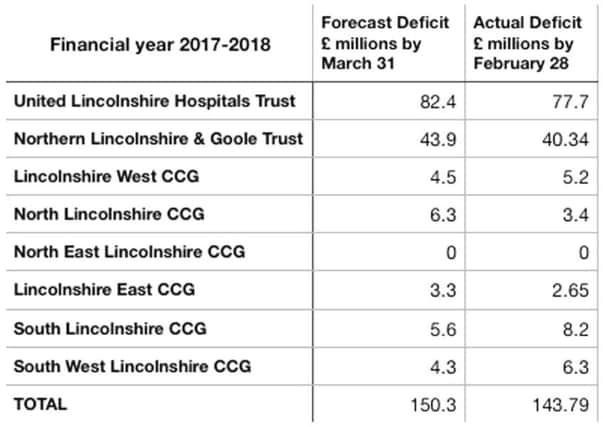Greater Lincolnshire health trusts and Clinical Commissing Groups expected £150m overspend


This means that hospital trusts and clinical commissioning groups (CCGs) are not financially sustainable based on the estimated and actual deficits by the end of the financial year.
Health trusts and CCGs across our region forecasted a total deficit of £150.3 million by April 1, while running an actual total deficit of £143.79 million.
Advertisement
Hide AdAdvertisement
Hide AdUnited Lincolnshire Hospitals Trust has the highest overspend with a forecast of £82.4 million by the end of the financial year.
ULHT is running a current deficit of £77.7 million, meaning it is looking at an increased overspend of 6% at the end of 2017/18.
Karen Brown, Director of Finance at ULHT, said: “This is higher than we had hoped, but does reflect a huge effort our staff have made to deliver £16 million of savings during the year.
“We have also put in place a range of controls and measures to help make savings, and we will be continuing to do this.
Advertisement
Hide AdAdvertisement
Hide Ad“We are committed to being a financially sustainable organisation, and our ambition is to improve patient services. We are working to ensure that all our service models focus on quality whilst being more productive and efficient.
“Going into the new financial year we will be working towards a plan to deliver £30 million in savings.”
Lincolnshire West CCG, which covers Lincoln, had an estimated deficit of £4.5 million, while Lincolnshire East CCG has an estimated overspend of £3.3 million.
South Lincolnshire CCG forecast a deficit of £5.6 million, which is significantly less than its actual overspend of £8.2 million.
Advertisement
Hide AdAdvertisement
Hide AdSouth West Lincolnshire CCG is also due to bring down its forecasted deficit of £6.3 million to £4.3 million actual overspend.
Northern Lincolnshire and Goole NHS Trust forecast a deficit of £43.9 million, £3.9 million off the trust’s target.
NLaG also recorded running a current deficit of £40.43 million, a 9% overspend on its overspend estimates.
Marcus Hassall, Director of Finance at NLaG, said: “This winter has been particularly challenging for the trust, as it has for many other healthcare providers. High demand for services and a challenging workforce position have contributed to an increase in spending on agency staff, drugs and clinical supplies.
Advertisement
Hide AdAdvertisement
Hide Ad“We must ensure that the trust is making effective use of every pound of public money we spend. We are forecasting a significant deficit for the end of the financial year, but we have worked hard to reduce this throughout the year.
“We are on track to achieve £11.3 million savings in year and have committed under our Improving Together programme to maximise savings in the next financial year without compromising on safety or quality.”
North Lincolnshire CCG forecast a deficit of £6.3 million against a current deficit of £3.4 million.
However, North East Lincolnshire CCG bucked the trend and estimated that it would break even by the end of March.
Advertisement
Hide AdAdvertisement
Hide AdLincolnshire county councillor Sue Woolley, cabinet member for NHS liaison, said that heath authorities need to do something about the overspends.
“I would ask the trust what they are doing about it because what I’m interested in is making sure our residents get high quality, safe services from the trust,” she said.
“I want to know if they have spent all that money, what are residents being denied?”
Responses from Greater Lincolnshire CCGs
Lincolnshire West CCG
Rob Croot, Chief Finance Officer, said: “The CCG is continually working to minimise or ideally eradicate any financial deficit.
Advertisement
Hide AdAdvertisement
Hide Ad“A number of factors have contributed to the identified improvement in the forecast outturn, including delivering the forecast month on month increase in savings actions and stopping non-patient-care expenditure wherever possible.
“The CCG has also chased up a number of outstanding allocation adjustments so as to ensure that these are effected before the end of the year.”
Lincolnshire East CCG
Sandra Williamson, Chief Finance Officer, said: “As a CCG we have a statutory duty to meet our financial targets. We have a financial plan which has been signed off by our governing body and our regulator, NHS England.
“This plan includes measures to contain costs through improving efficiencies and reducing unwarranted variation in demand.”
South Lincolnshire and South West Lincolnshire
Advertisement
Hide AdAdvertisement
Hide AdA spokesperson said: “As CCGs we have a statutory duty to meet our financial targets. We have financial plans which have been signed off by our governing bodies and our regulator, NHS England.
“The plans include measures to contain costs through improving efficiencies and reducing unwarranted variation in demand.”
North Lincolnshire
Emma Sayner, Chief Finance Officer, said: “As a responsible commissioner of health care services the CCG is looking at areas of opportunity for gaining increased value for money from its allocation.
“The main areas of focus for financial sustainability is through making more cost effective use of the prescribing budget, as well as managing patient need more appropriately between the health care sectors, with the aim of reducing wherever it is clinically appropriate, the use of more expensive acute service activity.”
North East Lincolnshire
Advertisement
Hide AdAdvertisement
Hide AdLaura Whitton, Chief Finance Officer, said: “The CCG has a strong track record of delivering financial balance, which is as a result of investment over a number of years in community services resulting in a reduced number of people needing to attend hospital and a focus on prevention and early help.
“The CCG having responsibility for adult social care as well as health, leading to a more integrated approach and good working relationship with general practice which supports system working.”
Calvin Robinson , Local Democracy Reporting Service